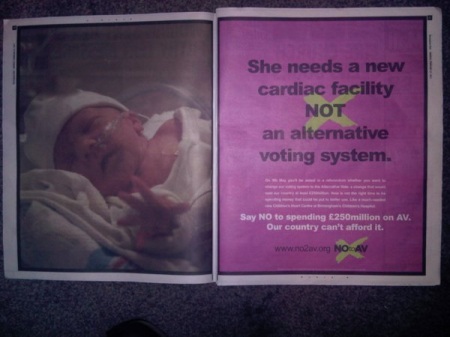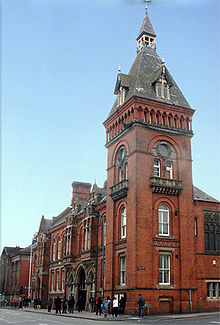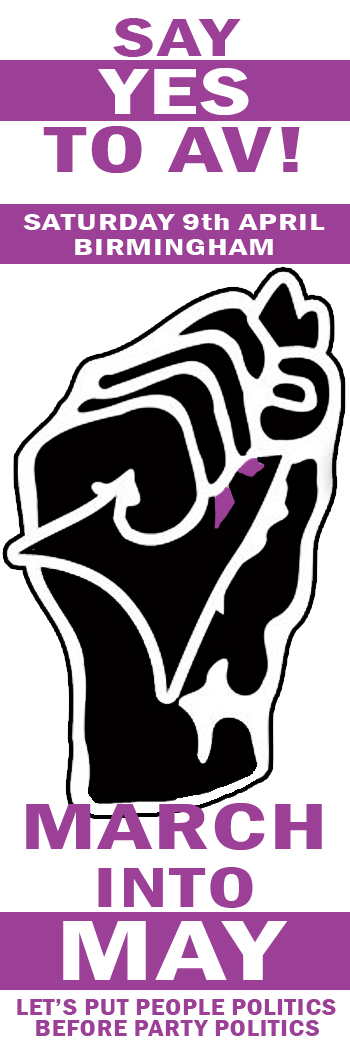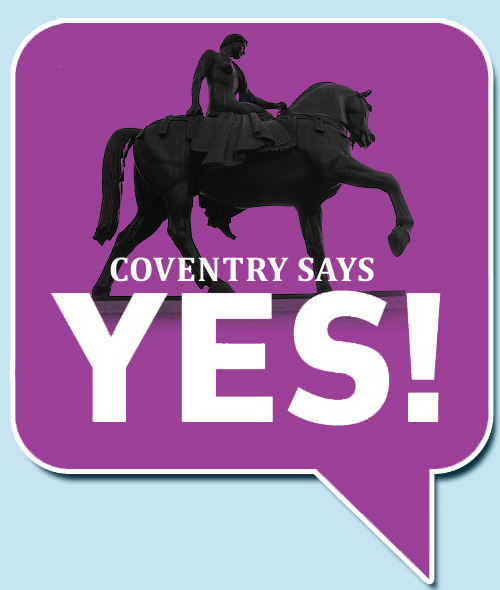A is for Australia
As the No campaign never tire of telling us, only three countries use AV at the moment. One of them is Australia. According to one poll commissioned by the Institute for Public Affairs, 57% of Australians wish to go back to FPTP rather than AV. The IPA describes itself as “Australia’s leading free market think tank. Promoting public policy based on individual liberty, limited government [and] free markets”. Call me cynical, but they don’t sound like the sort of body that is generally in favour of fluffy causes like a fairer voting system.
Antony Green is a political commentator in Australia who has been following the AV Referendum, and has become increasingly bemused by No2AV’s arguments. In this blog he goes into the opinions of Australians of the various voting systems in more detail. He actually finds that most Australians would actually prefer Optional Preference Voting – ie the version of AV that would be adopted in the UK – to either Compulsory Preference Voting or First Past the Post.
The No campaign are using Australia as the main case study, despite the fact that it’s a different system of preferential voting. In Australia, voters have to rank ALL candidates in order. The AV we’d have in Britain would be “optional preference”. As an Australian Labour activist wrote on Labour List:
It also gives a greater weight to first preference votes, decreasing the tendency of perverse outcomes such as where the candidate who comes third determines who wins in a three cornered contests.
The No campaign are also putting out other Australia-related falsehoods. Take this from Margaret Beckett, for instance:
It led to a significant drop in the number of people voting in Australia – that’s why they had to make voting compulsory. AV doesn’t help democracy, it stands in its way.
As was pointed out on Labour List, there’s no evidence for this – indeed, turnout was 71% in the first election held under AV and only declined in the next election.
B is for the BNP
William Hague has said that “A vote for AV would be a vote for the BNP”. Except the BNP would not benefit under AV. Indeed, apart from the Conservatives they are the only major party not to be in favour of a Yes vote. They say that it is “unfair to smaller parties”, whilst ignoring the fact that smaller parties such as UKIP and the Greens are in favour of AV. The fact is that AV would benefit these smaller parties as it would mean they pick up more first and second preference votes. The BNP, in contrast, would pick up very few second and third preferences.
I’ve written in far greater detail about whether the BNP would benefit in this post.
C is for Complicated
David Cameron has called AV “complicated”. It isn’t. Maybe Cameron has problems counting to five, but I’m pretty sure all British voters can.
As this flowchart demonstrates (taken from here) First Past the Post can, on occasion, be more complicated than AV!
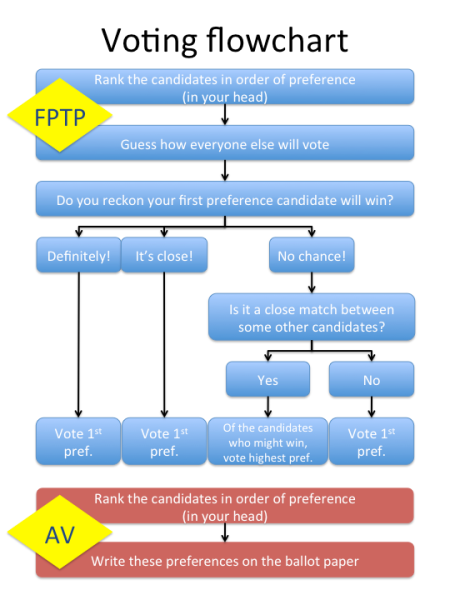
D is for Doorstep issue
Martin Kettle quotes an unnamed Conservative minister as saying that “The public have many priorities. This [electoral reform] just isn’t one of them”. Apparently we shouldn’t care about electoral reform because it isn’t brought up as an issue on the doorstep by voters.
I daresay it isn’t a doorstep issue, but it’s still important. Poverty in Africa, for instance, or climate change, are important issues but aren’t brought up on the doorstep either. Also, electoral reform should be important, as it can help address issues arising from people’s disconnect from politics and politicians.
In any case, this argument is a smokescreen from the No camp designed to get around the fact that AV is simply a better system than FPTP.
E is for Extra Votes
See number 2 of this from Conservative Home: “supporters of fringe parties can see their vote counted five or six times”. This is ridiculous. Everyone’s vote gets equal weight, and gets counted in every round, but some votes will be transferred to a different party.
David Cameron keeps making the argument that AV gives some people more than one vote, but he obviously hasn’t listened to his old university tutor, Vernon Bogdanor. This is what he wrote in an article for the Guardian:
But the no campaign’s claim that AV gives some voters two votes, also made by former foreign secretaries led by Douglas Hurd, is equally absurd. As Jo Swinson, Liberal Democrat MP for East Dunbartonshire, said on last week’s Question Time, if I ask you to buy me a Mars but a Mars is not available and I suggest you buy a Twix instead, I will not receive two bars of chocolate. A transferred vote is not a multiple vote.
The No campaign have rebranded in the last few weeks as “Keep One Person One Vote”, so I do want to hammer the point home that AV doesn’t give you more than one vote. Here’s Alan Renwick in A Citizen’s Guide to Electoral Reform:
Under the alternative vote, only one of a voter’s preferences counts towards the final result: each voter’s ballot has the same weight as any other. If your second preference is counted, that’s because the candidate to whom you gave your first preference has already been eliminated from the race. So no one has two votes. (pp66-7)
One final point on this is the letter a group of historians wrote urging people to vote No.
It’s a rather silly letter written by some people who have gone down in my estimations. Richard Evans, I thought you’d know better. Thankfully this pile of rubbish was nicely flattened by Hopi Sen.
They claim that “For the first time since 1928 and the granting of universal suffrage, we face the possibility that one person’s casting ballot will be given greater weight than another”. This is simply not true.
Until the end of the 1945-50 parliament, several seats in the House of Commons were reserved for the English Universities. Any graduate from these universities could vote in the election for these seats, in addition to their vote in the residential constituency. So the vote of University Graduates counted for more than that of non-graduates.
Further, from 1918 the elections for those seats were conducted by Single Transferable Vote. So Britain had both an unequal franchise, and a system of proportional representation in the House of Commons well after the introduction of universal suffrage.
The rest of the blog post is well worth reading.
Finally, just to put the issue to bed, or if you need more convincing, here’s Antony Green once more.
F is for Fiji
Fiji is one of those countries that has the AV system at the moment. The No2AV myths-busting blog says that they “want to scrap it”. Except that’s because they had a military coup in 2006, at which point their new government banned elections and made plans to rewrite the constitution. That’s why Fiji are thinking of scrapping AV.
Also, as was pointed out in the comments, Fiji has a very weird system of AV, in which it’s the candidate who decides where their second preferences go, rather than the voters of that candidate:
Voters are only expected to vote for a single party and then allow their chosen candidate to decide where their vote is sent if he/she is eliminated.
So it’s not even the same system that’s being proposed in Britain – it’s a much worse system.
G is for Gives more power to politicians, not voters
This was John Prescott’s line on Newsnight last week. It’s completely spurious, as it’s based on the fact that AV will lead to more hung parliaments (see “H”). Indeed, it gives voters more power, as AV ends tactical voting (see “I”). Also, MPs will have to work harder for their constituents and reach out beyond their core vote to win seats.
Indeed, the Jenkins Commission said that:
AV counters one important objection to electoral reform. This is the tendency to transfer power from voters to the subsequent deals of politicians (para 127)
H is for Hung Parliaments
David Cameron said in his No2AV speech that AV would mean hung parliaments would become “more commonplace”, with all the horsetrading which that implies. Leaving aside whether coalitions are a good or bad thing, AV won’t lead to more hung parliaments necessarily. There have been fewer hung parliaments in Australia, which uses AV, then in Britain, which uses FPTP. There’s simply no evidence to support Cameron’s claim.
Also, as this IPPR Report “Worst of Both Worlds: Why First Past the Post No Longer Works” makes clear, hung parliaments are equally likely under First Past the Post anyway. That’s primarily because more and more people have started voting for parties other than Labour or Conservative, as this chart makes clear:

- Blue = Conservative, Red = Labour, Yellow = Liberal/SDP/LibDem, Grey = Other
The report concludes:
Since the 1970s, UK citizens have shown a clear appetite to vote for third parties and to embrace a form of political pluralism which runs directly against the grain of the way FPTP operates. It is breaking down in a new context of multi-party politics. Designed for a world that no longer exists, it looks increasingly anachronistic in 21 st century Britain. Electoral trends since the 1970s are eroding FPTP’s ability to do what its advocates claim it does. As a result, unless it is reformed we can expect at least some of the following to happen, all of which profoundly undermine the case for its retention. (p21)
In other words, our current system is broken. AV would be a small but significant step towards fixing that system.
I is for Increases tactical voting
According to the “AV myth-busting” article, AV would reinvent tactical voting. This misses the point slightly. As the BBC defines it:
Tactical voting involves constituents who agree with the policies of one party deliberately choosing not to vote for their candidate.
Usually, this is because the candidate in question has little prospect of winning and so the voters prefer to give their second-choice options a better chance of winning the seat.
This type of tactical voting – essentially “do I vote with my head or my heart?” – is completely removed with AV. Say you are a Green voter in a Labour/Tory marginal. You might vote Labour, rather than Green, to ‘keep the Tories out’, because you see Labour as the “least-worst” option. Under AV you could vote Green as your first preference and still influence the outcome of the election with your second preference.
And the scenarios the No2AV campaign give for tactical voting under AV are ludicrous beyond belief:
For example, in a three way seat where both Labour and the Liberal Democrats were in danger of coming last, a Conservative might be tempted to give their first preference to Labour, for fear a Labour elimination would mean a hefty vote transfer to the Lib Dems.
This is such a ridiculous hyperthetical scenario it doesn’t even bear thinking about.
J is for the Jenkins Commission
The No campaign love to quote the Jenkins Commission report on electoral reform on AV. Take this, for instance:
He cited the danger of tactical voting wiping out a party, the “unpredictable’ disproportional link between seats and percent of the vote ‘it is even less proportional that FPTP [first past the post]”.
However, for some reason the No campaign never quote this bit (paragraph 126):
Under our system, AV would have a number of positive features which persuade a majority of us that it would be superior to FPTP as a method of choosing constituency representatives. First, there will be many fewer ‘wasted votes’ in the constituency side of the election, and far more voters will potentially influence the result. This, we hope, will encourage turn-out and participation. Second, it would encourage serious candidates to pitch their appeal to a majority of their constituents, rather than just seeking to target a hard-core minority of the party faithful. This should lead to more inclusive politics than FPTP. Third, because second and subsequent preferences may count, it will discourage individual candidates from intemperate attacks on their rivals, since they will be hoping to gain their second votes and will not wish to alienate their supporters. This should contribute to the more consensual and less confrontational politics to which the majority of the public appear to aspire.
Funny that.
K is for Kicking governments out
An aspect of FPTP David Cameron praised in his speech was the fact that it is decisive, and can be used to kick out unpopular governments:
There’s nothing more powerful than that – when people see their vote had led to the removal vans driving down Downing Street.
Except, as David Aaronovitch pointed out in the Times last Thursday (I came across the article in a copy of the paper in a Chinese takeaway, you can find it through the paywall if you really want to) AV would actually make it easier to remove unpopular governments. Voters would just rearrange their preferences so as not to vote for them. Jenkins calls this tactical voting – I’m not sure I agree with that. Can you call not voting for a party you don’t like tactical?
L is for Liberal Democrats
If you listen to the the No campaign, you’d assume that the Lib Dems are the only party that could benefit from AV being introduced. At their campaign launch Robert Winston said:
AV represented “a threat to democracy” since it is a constitutional change that will benefit one party, the Liberal Democrats.
There’s no reason why AV would automatically benefit the Lib Dems. It would only if people voted for them, and judging from recent polling data, that doesn’t look like it’ll be the case. Also, if it’s only the Lib Dems that benefit from AV, why are all the political parties apart from The Tories and the BNP in favour of it? As I said in “B”, parties such as the Greens and UKIP would get a lot of first and second preferences.
The simple fact is that voters are moving away from Labour and the Conservatives to other parties, as I argue here. The introduction of AV would be an acknowledgement of that change.
I’ve written more about the Lib Dems in No2AV plays the Nick Clegg card.
M is for Miserable little compromise
How Nick Clegg must regret saying that. It’s being used in all the No campaign literature now. However, as Paul Perrin has pointed out, he seems to be referring not to AV itself, but to the package of constitional reform that Labour was offering. What Clegg actually says about AV is this:
AV is a baby step in the right direction – only because nothing can be worse than the status quo.
So it’s an improvement on the present system.
N is for Nobody wants it
See number 6 of this Con Home article mentioned above. However, to quote John Rentoul, “I want it”.
So do a whole plethora of political parties and campaigning organisations, the Church of England, Colin Firth, Helena Bonham Carter, John Cleese and Eddie Izzard.
See also “W”.
O is for Obscure
See point 1 of that Con Home article cited above.
Except AV is used by the Labour Party and Liberal Democrats to elect their leaders, by trade unions to elect their representatives, by student union bodies, by MPs to appoint select committee chairs, the Church of England to elect Bishops, etc etc. It’s commonly used in Britain already (about 14 million people use it in Britain already). Close cousins of AV, such as the Supplementary Vote system, are used to elect elected Mayors, such as in London. AV is even used to decide Best Film at the Oscars.
Meanwhile FPTP is becoming ever-obscurer. As the IPPR report says:
Over the course of the 20th century, a number of states have opted to switch away from FPTP. From Australia in 1913 through to New Zealand in 1993, successions of states have embraced wholesale electoral reform. More tellingly, no major democracy in the modern era has gone the other way and adopted FPTP. Since 1945, only three new democracies have introduced FPTP based on the British model – Albania, Macedonia and Ukraine – and even these countries subsequently decided to switch to a different system.(p19)
I’ve said it before and I’ll say it again -FPTP is totally unsuited to modern-day politics.
P is for Papua New Guinea
Yup, it’s one of the three countries that uses AV. Which is more of an observation than a comment on the merits of First Past the Post. As is pointed out by Daniel in the comments, and by Renwick in A Citizen’s Guide to Electoral Reform, AV was introduced to try and reduce inter-tribal tensions, so that candidates would have to appeal beyond their own tribe. As Daniel says:
They originally had AV under Australian rule and it worked quite well for the tribal society, electing candidates who could appeal to and work with a broad selection of the population. Upon gaining independence they decided to choose the simpler system FPTP, however it lead to so many problems; divisiveness, corruption, negative and dirty electoral campaigning, and candidates winning constituencies with as little as 5% of the vote; they decided to return back to AV.
R is for Reasons to keep FPTP
The No campaign haven’t given us any. Probably because the advantages of FPTP, such as the constituency link, are retained by AV, whilst AV is also an improvement on the current system.
Q is for Quoting statistics on how past elections would have turned out under AV
I’ve written about this before:
You don’t know because people vote differently under different electoral systems. Also, the whole campaign would have been different, with candidates also campaigning for the second preference votes of voters for other parties, rather than merely relying on their core voters.
Under AV, the whole dynamic would have changed. Thus, you would see more votes for smaller parties (such as the Greens, the Pirates and, maybe, the Monster Raving Looney Party) because people could vote for a smaller party with their first preference whilst still being able to influence the outcome of the vote with their second. You would also have seen an increase in Tory first-preference voting, instead of some voting Lib Dem tactically. That’s because AV virtually ends tactical voting.
S is for Stick it to the coalition
This isn’t something coming from the No2AV campaign itself. However, it is a common argument I’ve seen from a certain type of Labour tribalist. It’s nonsense that was skewered very nicely by James Graham some months ago:
My fears that Labour would end up getting trapped into a mindset of “what’s bad for the coalition is good for us” have proven to be well founded, and it is an infection which has spread across the board, even among some relatively sensible types. A perfect example is AV. Leaving aside the rather tedious row about boundary changes (which, aside from some of the legitimate social justice issues at stake, amounts to two parties with a rather inflated sense of entitlement arguing about which party should be given the greatest unfair advantage), the idea that losing the AV referendum will damage the coalition is quite mistaken. It will certainly damage the Liberal Democrats, but we’ll have nowhere to go. Our only recourse will be batten down the hatches, refocus on Lords reform and a handful of other reforms, and hope for the best. It will be the Tory right that will hold all the cards, not Labour. The idea that suddenly we’ll decide to pull out of the coalition and meet our doom in an early general election is pure fantasy.
By contrast, what better way to undermine the Clegg-Cameron love in than for Labour to champion AV, and win? The Tory right will be damaged, Labour will come out smelling of roses and the Lib Dems’ influence within the coalition will increase. For many Tories, that will be simply unscionable. An unruly Tory backbench will make Lib-Lab cooperation in Parliament far easier. This is the prize Labour have within their grasp; yet they are so obsessed with ‘betrayal’ they simply can’t see it. I can only look on in despair.
Apologies for the lengthy quoting, but it really cannot be put any better than that.
T is for Two party politics
One of the many ridiculous articles on Labour Uncut about AV (they’ve started calling Fairer Votes campaigners drawing room Jihadists) had this to say about AV:
We’ve waited for generations for a chance to destroy the Liberal Democrats and get British politics back to its natural balance of a two party democracy.
How much can you get wrong in just a single sentence? For a start, this isn’t all about the Liberal bloody Democrats! Also, the two party system has gone. It’s dead. It’s an ex-system.
Why should a two-party system be “natural” for Britain? Over one-third of voters voted for a party other than Labour or Conservative, when that figure was 5% fifty years ago. British politics is more pluralist now. Deal with it.
U is for Unaffected Constituencies
The myth-busting article says:
AV would make no difference in nearly 300 safe seats where the sitting MP has 50% of the vote, or is close to it.
Which of course means that it would make a difference in half of seats. Which means it’s an improvement on the present system. Nobody is suggesting that AV is the cure for all our ills, but it is an improvement on the present system.
V is for Voter ballot papers are printed by Yes to Fairer Votes
The only new entry in my A-Z of rubbish arguments. The Spectator in particular have gone overboard on this issue. This is their first post on the issue. Basically, Yes2AV are funded by the Electoral Reform Society. And the ERS:
…turns out to be the majority shareholder in Britain’s leading and highly profitable supplier of election services, and its dividends are funding the campaign. The business, which is called Electoral Reform Services Ltd, turns over £21m.
ERSL (too many acronyms in this piece, aren’t there?) is the supplies ballot papers and vote counting machines, etc.
The Spectator, and other areas of the right-wing press, are trying to spin this non-story into one saying that the Yes campaign is heavily financed by a large, corporate vested interest. Just last week they posted this, saying that, er, ballot papers and Yes2AV leaflets were being printed on the same machines. Because obviously the ballot papers will be somehow contaminated by the filthy prescence of Yes literature.
This is a complete non-story. For a start, the ERS and the ERSL are two legally separate companies, so there’s no dodgy dealings afoot. Second, the Spectator try and imply that the ERSL will profit from providing vote-counting machines, but there are no plans to introduce vote counting machines because of AV!
Also, and I cannot believe I have to point this out to journalists, but Electoral Reform Society supports electoral reform is not, cannot and won’t ever be a story.
Once again we have slurs from the No camp to distract us from the fact that AV is simply a better system.
W is for Would rather have PR
I’ve written about this before too. Basically, the best way to get PR is to have a resounding “Yes” vote on a high turnout. How would a No vote further the cause for PR? That thought is ridiculous.
It’s true that groups such as the Electoral Reform Society would prefer PR. But AV is the deal on the table, and it’s an improvement on the current system. If someone offers you half a loaf of bread, you’re going to take it, because it’s better than no bread at all.
X is for eXpensive (!)
AV will cost £250m! Except £82m of that is apparently the cost of holding the referendum, which would be incurred even if there is a No vote. And £130m of that is on buying voter counting machines. They don’t use them in Australia, which uses AV, but DO use them in America, which uses FPTP. That’s a massive fail from No2AV then.
I’ve written about this in more detail too, in There are just two minor flaws with No2AV’s claim that AV will cost £250m…
Y is for Yes to Fairer Votes kills babies
I wrote about this before too. Yesterday an even worse advert appeared in the Birmingham Mail:
It’s a disgusting and misleading ad, as Left Foot Forward rightly points out. There’s another good blog by Stephen Baxter at the New Statesman here.
Z is for Zzzzzzzzzzzzzzz……
Well done for making it to the end!
I’m bored of these stupid arguments from No2AV. It’d be nice if once, just once, they would engage with the issues, and present the British public with a positive case to keep FPTP. Sadly, it seems we have another two months of negative campaigning. Such, such are the joys.
This originally appeared at Paperback Rioter.

